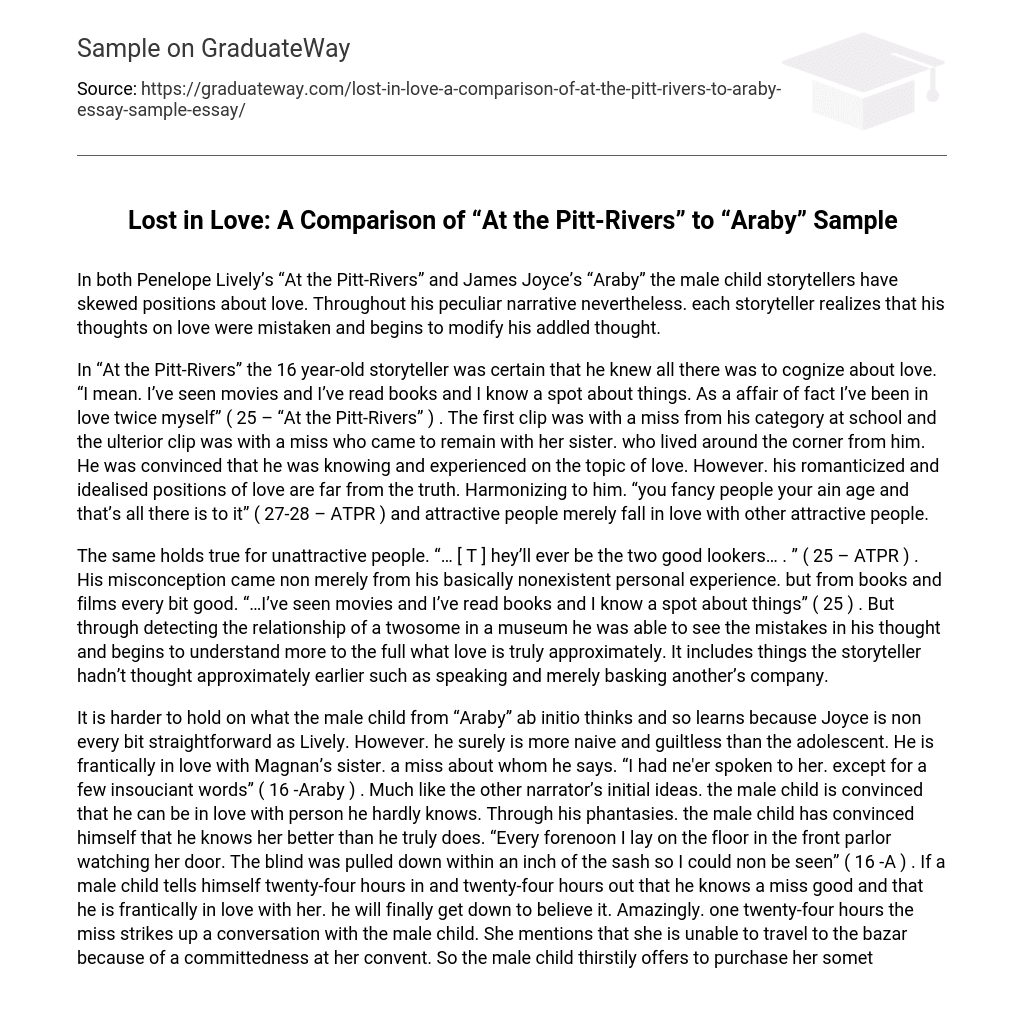In both Penelope Lively’s “At the Pitt-Rivers” and James Joyce’s “Araby” the male child storytellers have skewed positions about love. Throughout his peculiar narrative nevertheless. each storyteller realizes that his thoughts on love were mistaken and begins to modify his addled thought.
In “At the Pitt-Rivers” the 16 year-old storyteller was certain that he knew all there was to cognize about love. “I mean. I’ve seen movies and I’ve read books and I know a spot about things. As a affair of fact I’ve been in love twice myself” ( 25 – “At the Pitt-Rivers” ) . The first clip was with a miss from his category at school and the ulterior clip was with a miss who came to remain with her sister. who lived around the corner from him. He was convinced that he was knowing and experienced on the topic of love. However. his romanticized and idealised positions of love are far from the truth. Harmonizing to him. “you fancy people your ain age and that’s all there is to it” ( 27-28 – ATPR ) and attractive people merely fall in love with other attractive people.
The same holds true for unattractive people. “… [ T ] hey’ll ever be the two good lookers… . ” ( 25 – ATPR ) . His misconception came non merely from his basically nonexistent personal experience. but from books and films every bit good. “…I’ve seen movies and I’ve read books and I know a spot about things” ( 25 ) . But through detecting the relationship of a twosome in a museum he was able to see the mistakes in his thought and begins to understand more to the full what love is truly approximately. It includes things the storyteller hadn’t thought approximately earlier such as speaking and merely basking another’s company.
It is harder to hold on what the male child from “Araby” ab initio thinks and so learns because Joyce is non every bit straightforward as Lively. However. he surely is more naive and guiltless than the adolescent. He is frantically in love with Magnan’s sister. a miss about whom he says. “I had ne’er spoken to her. except for a few insouciant words” ( 16 -Araby ) . Much like the other narrator’s initial ideas. the male child is convinced that he can be in love with person he hardly knows. Through his phantasies. the male child has convinced himself that he knows her better than he truly does. “Every forenoon I lay on the floor in the front parlor watching her door. The blind was pulled down within an inch of the sash so I could non be seen” ( 16 -A ) . If a male child tells himself twenty-four hours in and twenty-four hours out that he knows a miss good and that he is frantically in love with her. he will finally get down to believe it. Amazingly. one twenty-four hours the miss strikes up a conversation with the male child. She mentions that she is unable to travel to the bazar because of a committedness at her convent. So the male child thirstily offers to purchase her something if he goes.
Dayss subsequently. when he eventually goes to the bazar. he instantly begins looking at the porcelain vases and flowered tea-sets. He thinks that this is the gift most fitting for the object of his fondnesss because white porcelain and flowers represent pureness and hence the object of his love. Magnan’s sister is the most pure individual he can conceive of. After farther scrutiny of the choice of gifts. he realizes that he does non hold about adequate money to purchase anything. While at the bazar. he overhears a conversation between a immature adult female and to immature work forces. “‘O. I ne’er said such a thing! ’ ‘O. but you did! ’ ‘O. but I didn’t! ’ ‘Didn’t she say that? ’ ‘Yes I heard her. ’ ‘O. there’s a…fib! ‘” They are clearly chat uping. but the male child is confused. He has been brought up in a civilization which taught male childs that adult females are the most pure existences in the universe. Yet she is chat uping with these two work forces. His eyes burn as he begins to understand that adult females are non all perfect and that he can non purchase Magnan’s sister’s love.
In each narrative the storyteller starts out with naive and immature positions on love. The adolescent in “At the Pitt-Rivers” learns that love is non what he thought it was. Age does non count in love and neither do expressions. He discovers that being in love includes speaking and disbursement clip with another individual. things he had non truly considered before. The adolescent learns his lessons through observing. The male child from “Araby” learns through personal experience. He realizes that no adult female is perfect and that people need to cognize each other good before a genuinely successful and loving relationship can develop. In each short narrative the immature storyteller realizes that love is non what it seemed to be at first.





